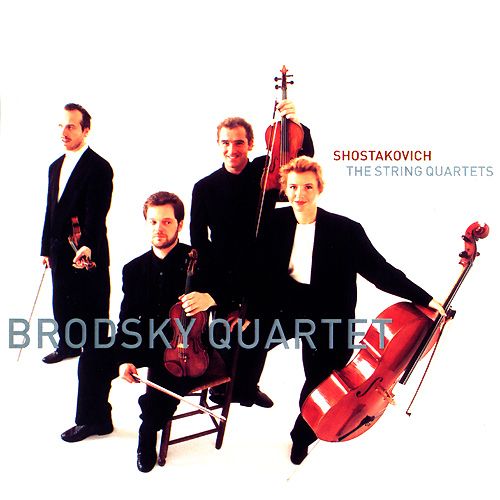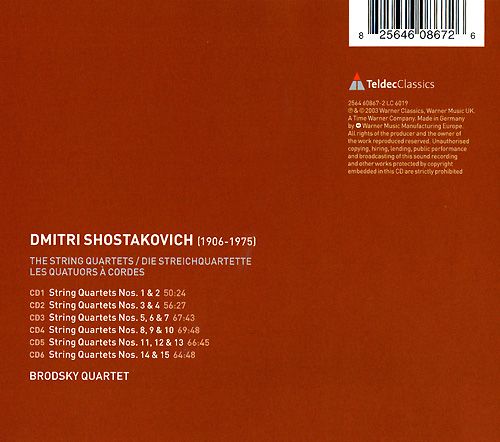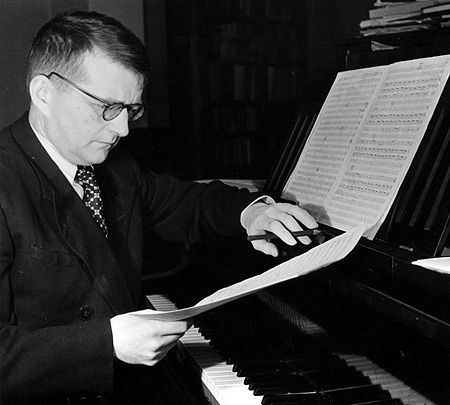wimpel69
12-10-2014, 07:38 PM
EAC-FLAC link below. This is my own rip.
Cover & booklet included. Do not share. Buy the original!
Please leave a "Like" or "Thank you" if you enjoyed this!
Dmitri Dmitriyevich Shostakovich wrote fifteen string quartets and in listening to any of them
some background information is essential. There are two reasons: first Shostakovich lived in a period of
history and in a society which has now vanished. His creative life was deeply influenced by the ideology
and practice of Soviet communism and the polemics of the Cold War, two factors which not only
determined the body politic but restricted intellectual freedom in Russia in all disciplines ranging
from genetics to pure mathematics, from chess theory to classical music composition.
Shostakovich was the Soviet Union's most outstanding composer achieving almost iconic status in his
lifetime. He was a patriotic Russian, a loyal communist and a willing part of the elite. Publicly he
identified himself with the Soviet Union's political system but privately he refused to accept its
cultural restrictions and at times he pushed artistic innovation to the limits of political acceptance.
As a consequence some of his compositions were condemned as being incompatible with the
official definition of acceptable music and at times his life in the Soviet Union became precarious.
An understanding, therefore, of how and why artistic freedom within the Soviet Union was restricted,
as well as the Soviet Union's theory of aesthetics, is useful for a deeper appreciation of Shostakovich's
works.
The second reason why extra-musical knowledge seems essential for a deeper understanding of
Shostakovich's string quartets is that they appear to have semantic content: they seem to be saying
something. This is in itself strange for just as it would appear impossible for purely instrumental
music to represent social reality (which is what 'Socialist Realism' demanded) so too would it
seem impossible for music without the aid of words to convey a message. Yet throughout his
works Shostakovich makes intensive use of musical quotations from songs, operettas and
operas all of which have, of course, textual content. Furthermore his compositions contain,
like many composers before him, encryptions achieved through numbers and the letters
associated with notes. As a result Shostakovich's works give an impression of containing
covert messages.
But this desire to analyse must be held in check. Deciphering covert messages will certainly
enhance our understanding, but it fails to explain our emotional delight. Shostakovich's
most famous quartet, the Eighth, is easily dissected but its power is typically encountered
long before any understanding of its origins.
A description of each individual quartet can be read by clicking the relevant number in the
navigation bar at the top of the page. Each description contains an example taken
from a movement (usually one of the lighter ones!) from the quartet in question.
A close examination of the choice of key for each quartet shows that Shostakovich was
following a plan; a plan that would illustrate his identification with the cycle by associating
his initials with certain quartets.

Music Composed by
Dmitri Shostakovich
Played by the
Brodsky String Quartet

"The performances by the Emerson, Fitzwilliam and Brodsky are quite different while equally valid.
The Fitzwilliam version is richly romantic and emotionally charged, sort of the "Leopold Stokowski"
performance. The Emerson quartet version is at times fast, tense, highly energetic, sort of like an
"Arturo Toscanini" version. The Brodsky version is carefully crafted, balanced, slightly understated,
like a version by "Sir Adrian Boult." Why on earth would anyone want to understate things? Not
because, as some people seem to feel, Sir Adrian and the British are afraid of expressing feelings,
but because by understating the emotionalism in the music other aspects of the music are more
clearly appreciated, and the overall musical experience is richer. Therefore one could easily find
the Brodsky version to be the best version by a British quartet.
In the first quartet, for instance, the Emersons take the first two "moderato" movements faster
than anybody else, but their playing does not sound rushed, just a nicely pulsed andante. Here
the Brodskys are relatively slow but no one plays the music more interestingly. In the third
movement, "allegro molto" everybody plays it about as fast as they can, with the Emersons
not noticeably faster, nor noticeably any more precise nor incisive. In the first movement of the
second quartet, the Emersons use slightly exaggerated rhythmic accents, but their performance
is no faster than the Brodskys or Borodiners nor is it ultimately more dramatic, just more
marked in texture and perhaps a shade less graceful. The Brodskys play the second movement
with beauty and great sadness, but also with a little dignity as if to say that continuing to
live may be possible after all. But it is in this movement in the Borodin Quartet performance
where Dubinsky�s solo attains Olympian heights of passion and terror. You must have this
recording of this movement in your collection if you love Shostakovich, but don�t ever listen
to it alone in the dark. The disk should bear a warning label!
In the Eighth Quartet the Emersons bring in the fastest version ever recorded, accomplishing
the fourth movement "largo" in nearly 20% less time than the others, but they do not
slight the stark, dramatic pauses between the opening chords. The Brodskys and the
Borodiners are both on the slow side in this one, matching timing within a second. Both
play with passion, yet things do move along at a properly dramatic pace, there is no
sense of dragging out the music. Again, the Borodiners are the most intense.
The Borodiners play the slowest #12 and the fastest #13 on disk. Since these were the
earliest of these recordings of these works, more moderate consensus tempi have
developed subsequently, as encountered in the Fitzwilliam recording based on
performances authorised by the composer, and observed by the Emerson Quartet.
The Brodsky Quartet plays the consensus tempo on #12, but gives us the very slowest
version of #13. But in direct comparison these slowest and fastest performances
both sound perfectly convincing but also in many ways quite different.
If you do not presently own a version of these quartets, then the Brodsky would
be a very good one as a first set. Then, if you want them warmer and sweeter,
buy the Fitzwilliam Quartet version; if you want them brisker, buy the Emerson
Quartet version. If you intend to have multiple versions in your collection, the
Borodin I version on Chandos Historical is an absolute must-have � but only
if you are secure that any tendencies you may have towards suicidal depression
are completely under control. By this time you will have at least one version
each of the last two quartets and can accept their absence in the Chandos set.
But what a pity that we will never hear Dubinsky play the 15th!
In the third movement of Quartet #2 listen for that little pizzicato figure that
made such a nice touch in Alan Hovhaness� Mt. St. Helens Symphony. In
Quartet #13 listen for the "Ya Khachu!" motif from Shostakovich�s 14th
Symphony; it�s a Russian joke, sounding like a sneeze, which can have
interesting meanings in Slavic folklore, but it actually means "I desire!"
And listen if you choose for the so-called "12 tone" experiments in the
later quartets; but as Tovey says it is not necessary to invent strange systems
to account for dissonant notes in tonal music, and with the unlamented and
nearly universal disappearance of serial music Shostakovich�s "experiments"
are actually more interesting viewed entirely in a tonal context."
Musicweb

Download Link - https://mega.co.nz/#!7QJC3SrJ!Wl9WQO9b-1hmzMS5SCLdJT5L4iiLjXWJiK8FgntcOeM
Source: Virgin Classics, 1989/2001 (my rip!)
Format: FLAC(RAR), DDD Stereo, Level: -5
File Size: 1.44 GB (incl. artwork, booklet, logs and cues)
Enjoy! Don't share! Buy the origina! Please leave a "Like" or "Thank you" if you enjoyed this! :)
Cover & booklet included. Do not share. Buy the original!
Please leave a "Like" or "Thank you" if you enjoyed this!
Dmitri Dmitriyevich Shostakovich wrote fifteen string quartets and in listening to any of them
some background information is essential. There are two reasons: first Shostakovich lived in a period of
history and in a society which has now vanished. His creative life was deeply influenced by the ideology
and practice of Soviet communism and the polemics of the Cold War, two factors which not only
determined the body politic but restricted intellectual freedom in Russia in all disciplines ranging
from genetics to pure mathematics, from chess theory to classical music composition.
Shostakovich was the Soviet Union's most outstanding composer achieving almost iconic status in his
lifetime. He was a patriotic Russian, a loyal communist and a willing part of the elite. Publicly he
identified himself with the Soviet Union's political system but privately he refused to accept its
cultural restrictions and at times he pushed artistic innovation to the limits of political acceptance.
As a consequence some of his compositions were condemned as being incompatible with the
official definition of acceptable music and at times his life in the Soviet Union became precarious.
An understanding, therefore, of how and why artistic freedom within the Soviet Union was restricted,
as well as the Soviet Union's theory of aesthetics, is useful for a deeper appreciation of Shostakovich's
works.
The second reason why extra-musical knowledge seems essential for a deeper understanding of
Shostakovich's string quartets is that they appear to have semantic content: they seem to be saying
something. This is in itself strange for just as it would appear impossible for purely instrumental
music to represent social reality (which is what 'Socialist Realism' demanded) so too would it
seem impossible for music without the aid of words to convey a message. Yet throughout his
works Shostakovich makes intensive use of musical quotations from songs, operettas and
operas all of which have, of course, textual content. Furthermore his compositions contain,
like many composers before him, encryptions achieved through numbers and the letters
associated with notes. As a result Shostakovich's works give an impression of containing
covert messages.
But this desire to analyse must be held in check. Deciphering covert messages will certainly
enhance our understanding, but it fails to explain our emotional delight. Shostakovich's
most famous quartet, the Eighth, is easily dissected but its power is typically encountered
long before any understanding of its origins.
A description of each individual quartet can be read by clicking the relevant number in the
navigation bar at the top of the page. Each description contains an example taken
from a movement (usually one of the lighter ones!) from the quartet in question.
A close examination of the choice of key for each quartet shows that Shostakovich was
following a plan; a plan that would illustrate his identification with the cycle by associating
his initials with certain quartets.

Music Composed by
Dmitri Shostakovich
Played by the
Brodsky String Quartet

"The performances by the Emerson, Fitzwilliam and Brodsky are quite different while equally valid.
The Fitzwilliam version is richly romantic and emotionally charged, sort of the "Leopold Stokowski"
performance. The Emerson quartet version is at times fast, tense, highly energetic, sort of like an
"Arturo Toscanini" version. The Brodsky version is carefully crafted, balanced, slightly understated,
like a version by "Sir Adrian Boult." Why on earth would anyone want to understate things? Not
because, as some people seem to feel, Sir Adrian and the British are afraid of expressing feelings,
but because by understating the emotionalism in the music other aspects of the music are more
clearly appreciated, and the overall musical experience is richer. Therefore one could easily find
the Brodsky version to be the best version by a British quartet.
In the first quartet, for instance, the Emersons take the first two "moderato" movements faster
than anybody else, but their playing does not sound rushed, just a nicely pulsed andante. Here
the Brodskys are relatively slow but no one plays the music more interestingly. In the third
movement, "allegro molto" everybody plays it about as fast as they can, with the Emersons
not noticeably faster, nor noticeably any more precise nor incisive. In the first movement of the
second quartet, the Emersons use slightly exaggerated rhythmic accents, but their performance
is no faster than the Brodskys or Borodiners nor is it ultimately more dramatic, just more
marked in texture and perhaps a shade less graceful. The Brodskys play the second movement
with beauty and great sadness, but also with a little dignity as if to say that continuing to
live may be possible after all. But it is in this movement in the Borodin Quartet performance
where Dubinsky�s solo attains Olympian heights of passion and terror. You must have this
recording of this movement in your collection if you love Shostakovich, but don�t ever listen
to it alone in the dark. The disk should bear a warning label!
In the Eighth Quartet the Emersons bring in the fastest version ever recorded, accomplishing
the fourth movement "largo" in nearly 20% less time than the others, but they do not
slight the stark, dramatic pauses between the opening chords. The Brodskys and the
Borodiners are both on the slow side in this one, matching timing within a second. Both
play with passion, yet things do move along at a properly dramatic pace, there is no
sense of dragging out the music. Again, the Borodiners are the most intense.
The Borodiners play the slowest #12 and the fastest #13 on disk. Since these were the
earliest of these recordings of these works, more moderate consensus tempi have
developed subsequently, as encountered in the Fitzwilliam recording based on
performances authorised by the composer, and observed by the Emerson Quartet.
The Brodsky Quartet plays the consensus tempo on #12, but gives us the very slowest
version of #13. But in direct comparison these slowest and fastest performances
both sound perfectly convincing but also in many ways quite different.
If you do not presently own a version of these quartets, then the Brodsky would
be a very good one as a first set. Then, if you want them warmer and sweeter,
buy the Fitzwilliam Quartet version; if you want them brisker, buy the Emerson
Quartet version. If you intend to have multiple versions in your collection, the
Borodin I version on Chandos Historical is an absolute must-have � but only
if you are secure that any tendencies you may have towards suicidal depression
are completely under control. By this time you will have at least one version
each of the last two quartets and can accept their absence in the Chandos set.
But what a pity that we will never hear Dubinsky play the 15th!
In the third movement of Quartet #2 listen for that little pizzicato figure that
made such a nice touch in Alan Hovhaness� Mt. St. Helens Symphony. In
Quartet #13 listen for the "Ya Khachu!" motif from Shostakovich�s 14th
Symphony; it�s a Russian joke, sounding like a sneeze, which can have
interesting meanings in Slavic folklore, but it actually means "I desire!"
And listen if you choose for the so-called "12 tone" experiments in the
later quartets; but as Tovey says it is not necessary to invent strange systems
to account for dissonant notes in tonal music, and with the unlamented and
nearly universal disappearance of serial music Shostakovich�s "experiments"
are actually more interesting viewed entirely in a tonal context."
Musicweb

Download Link - https://mega.co.nz/#!7QJC3SrJ!Wl9WQO9b-1hmzMS5SCLdJT5L4iiLjXWJiK8FgntcOeM
Source: Virgin Classics, 1989/2001 (my rip!)
Format: FLAC(RAR), DDD Stereo, Level: -5
File Size: 1.44 GB (incl. artwork, booklet, logs and cues)
Enjoy! Don't share! Buy the origina! Please leave a "Like" or "Thank you" if you enjoyed this! :)